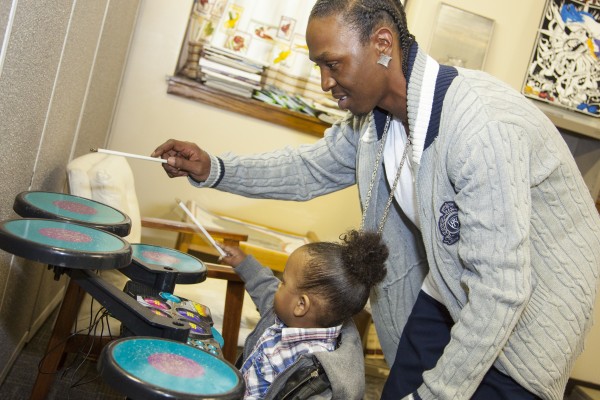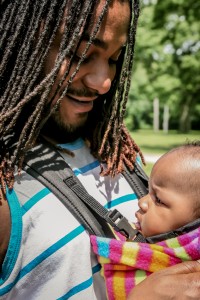
Dads are important and not just on Father’s Day.
National research shows children with involved, loving parents are significantly more likely to do well in school, have healthy self-esteem, exhibit empathy and pro-social behavior, and avoid high-risk behaviors like drug use, truancy and criminal activity.
Today’s dads are taking on new roles. Unfortunately, many fathers face significant challenges in staying part of their children’s lives. Many are unemployed or under-employed, yet many also are involved in parenting – driving moms to prenatal appointments or taking care of the children.
In recent years, the federal government has encouraged more research on the role of fathers in family life and child development. A 2013 study of fathers’ involvement by the Centers for Disease Control and Prevention showed that fathers who live with their children have become more involved in their children’s lives than in previous generations. Although fewer fathers now live with their children because more children are born outside of marriage, the study found this impact is moderated because many parents who aren’t married do live together.
Researchers and faculty members at UWM are working with others in the community to help Milwaukee fathers overcome barriers and stay involved with their children.
Here are a few of their current projects:
Advocating for African-American fathers
An associate professor in the Helen Bader School of Social Welfare, David J. Pate Jr. became interested in the challenges facing African-American fathers as he read about stereotypes of absentee fathers while in graduate school at the University of Chicago. He was reminded of his own dad, uncles and other relatives who were hard working and actively involved in raising their families.
Today, Pate is a leading expert on and advocate for low–income African-American men as a member of both the National Advisory Board of the Responsible Father Research Network and a U.S. Department of Health and Human Services expert panel on the needs of young fathers.
One of his current research partnerships is with Milwaukee County’s Pathways to Responsible Fatherhood Project, a federally funded effort that involves a number of agencies, including My Father’s House, a long-time community partner in Pate’s work. Pate is examining how programs can help non-custodial fathers overcome barriers including unemployment, depression and higher health risks related to chronic stressors like poverty and trauma.

(UWM Photo/Pete Amland)
My Father’s House CEO Albert Holmes explains that the organization supports men in building relationships with their children, helping them find jobs, providing job training and offering parenting education and life skills training.
“As a country, we don’t do well at prioritizing services for men,” adds Pate, who also is an affiliated member of the Institute for Research on Poverty at the University of Wisconsin-Madison. “Much of what we offer is geared to women and children. That’s important, but life can be difficult for men, even if they are trying to be fathers and caretakers.”
Direct Assistance for Dads (DAD) Project
Expectant and new fathers get one-on-one coaching and home visits, encouraging them to increase their involvement with their children and their partners through the Direct Assistance for Dads (DAD) Project. Geoffrey Swain, chief medical officer for the City of Milwaukee Health Department, professor at the University of Wisconsin School of Medicine and Public Health, and an adjunct faculty member in UWM’s Zilber School of Public Health, advises the program.
Dads are referred through community agencies and Milwaukee Public Schools, and some refer themselves. The 50 dads participating receive home visits from trained fatherhood involvement specialists every other week to help them improve their parenting skills, their relationships with the child and the child’s mother and their own education and work skills. The home visitation workers can also help the dads navigate complex questions of child support and visitation.
“But these dads want to do more for their children than just provide economic support,” says Darcy DuBois, the health department’s DAD Project program manager. “Feedback from the fathers,” she adds, “has been overwhelmingly positive.”

(Photo Courtesy of Milwaukee Health Department/TJ Lambert)
Engaging fathers in prenatal care
Pate and Kris Barnekow, associate professor in the College of Health Sciences, have been working with the Lifecourse Initiative for Healthy Families on a project to help fathers become more engaged and supportive even before their babies are born.
“We really wanted to better understand African-American fathers’ experience and knowledge about the pre-natal period,” says Barnekow. “We wanted to know what they knew and understand, and where did they feel they needed more information.”
One of the goals was to help expectant fathers understand how they could support mothers better, relieving their stress and possibly help avoid premature birth – a key risk factor in infant mortality.
“It was really exciting to be able to get 40 men, who might be feeling they were left on the outside, to come and talk and know that they would be heard,” Barnekow says. The research is supported by the Wisconsin Partnership Program at the University of Wisconsin School of Medicine and Public Health.
Next step, pending funding, will be to develop a social media campaign and other communications based on Pate and Barnekow’s findings, then test these tools with more fathers-to-be.
Expecting Mom, Expecting Dads
Babies don’t come with instructions. Moms can get a start on learning what to expect when they’re expecting, but dads, especially low-income African-American dads, often get left out of the preparation and prenatal care. That’s why Emmanuel Ngui, assistant professor in the Zilber School of Public Health, partnered with Wheaton Franciscan – St. Joseph Women’s Outpatient Center and The Parenting Network to pilot a father-enhanced CenteringPregnancy prenatal care curriculum with African-American couples. “Expecting Mom, Expecting Dads” is a pilot project aimed at improving birth outcomes by better integrating and engaging fathers as supportive partners during prenatal care and throughout pregnancy. The project’s findings show that fathers are interested in learning about pregnancy and prenatal care.
“They welcomed the opportunity to talk with and learn from other fathers,” says Ngui. “They liked being part of the pregnancy and delivery process.”
Couples liked attending prenatal care together and identified some key barriers to paternal engagement including: providers’ attitudes towards minority fathers, limited pregnancy knowledge, stress and unsupportive structural and economic policies on fathers. Facilitators included active inclusion/linkage of fathers to resources and creating a positive/supportive prenatal care environment that fosters paternal engagement. Although the pilot involved a small group, the birth outcomes were positive with all babies born full term weighing between 7- to 9-pounds, according to Ngui. “Our team is exploring ways of conducting a larger intervention with more couples and multiple sites,” he says.
Milwaukee Young Parenthood Project

(Photo courtesy of Milwaukee Health Department/TJ Lambert)
Seven out of 10 children are now born to unmarried parents under the age of 25, a three-fold increase since 1980. The Milwaukee Young Parenthood Project is looking at ways to involve fathers and mothers in co-parenting. This three-year project is looking at different versions of an innovative counseling program to help young unmarried parents provide stability and nurture their children.
Paul Florsheim, professor in the Zilber School of Public Health, wrote a book about the efforts and leads the current project. Working in collaboration with St. Joseph’s Hospital, Milwaukee Health Services Inc. and Milwaukee Public Schools, the project is recruiting 150 couples to take part in the most recent study. The goal, says Florsheim, is to give these young parents – regardless of their marital or romantic status – the skills to provide a safe, secure home environment for their children. “We are hoping to increase family stability for the sake of the next generation,” says Florsheim.







